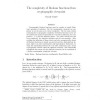Free Online Productivity Tools
i2Speak
i2Symbol
i2OCR
iTex2Img
iWeb2Print
iWeb2Shot
i2Type
iPdf2Split
iPdf2Merge
i2Bopomofo
i2Arabic
i2Style
i2Image
i2PDF
iLatex2Rtf
Sci2ools
121
click to vote
DAGSTUHL
2006
2006
The complexity of Boolean functions from cryptographic viewpoint
Cryptographic Boolean functions must be complex to satisfy Shannon's principle of confusion. But the cryptographic viewpoint on complexity is not the same as in circuit complexity. The two main criteria evaluating the cryptographic complexity of Boolean functions on Fn 2 are the nonlinearity (and more generally the r-th order nonlinearity, for every positive r < n) and the algebraic degree. Two other criteria have also been considered: the algebraic thickness and the non-normality. After recalling the definitions of these criteria and why, asymptotically, almost all Boolean functions are deeply non-normal and have high algebraic degrees, high (r-th order) nonlinearities and high algebraic thicknesses, we study the relationship between the r-th order nonlinearity and a recent cryptographic criterion called the algebraic immunity. This relationship strengthens the reasons why the algebraic immunity can be considered as a further cryptographic complexity criterion.
Related Content
| Added | 30 Oct 2010 |
| Updated | 30 Oct 2010 |
| Type | Conference |
| Year | 2006 |
| Where | DAGSTUHL |
| Authors | Claude Carlet |
Comments (0)

